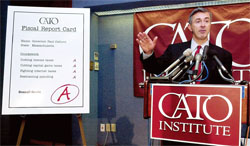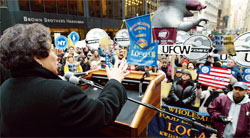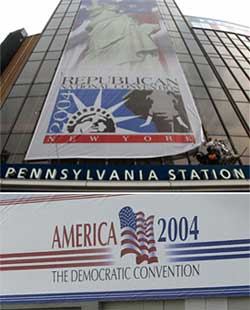国務省出版物
米国の統治の仕組み – 公共政策に影響を及ぼす民間の組織や機関

2001 年、ワシントンD.C. にあるシンクタンク、ケイトー研究所で会員に講演するマサチューセッツ州の当時の知事ポール・セルーチ。公共政策について研究し、論文を書く研究者の集まりであるシンクタンクは、政府に影響を及ぼすことを模索する、合衆国の数多い民間団体のひとつである
米国の統治制度は、審議を尽くし、市民にとって身近であり、多種多様な意見や利害を受け入れるように作られている。時の経過とともに、政府が進化し発展してきたのと同様に、政府に影響力を及ぼそうとする諸機関も進化と発展を遂げてきた。
米国のメディアは民間企業が牛耳っており、政府による政治的検閲は行われていない。米国には、独立した新聞・雑誌・テレビなどのメディアが、政府の政策を批判する見解、支持する見解の双方を含む多様な見解を伝えるという強い伝統がある。
公共政策への影響力という点で、メディアは少なくとも3 つの重要な機能を果たしている。第1に、政策立案者は常に巨大なメディア産業の監視下に置かれている。公職者たちは、自分の言動が、場合によっては私生活における言動まで含め、ことごとくメディアに報じられかねないことを認識している。このため、報道してほしくない決定や行為を避けようとする。
第2に、メディアは公共政策問題について事実を報道し、独自の分析を行うことにより、一般の人々を啓発している。最後に、メディアは、出版者や放送者(およびその読者や視聴者)が他の人々に影響を与える可能性のある意見を表明する場となっている。例えば、多くの大手新聞社が、特定の候補者を支持したり、2つの政策の一方を支持する社外の寄稿を掲載したりしている。
メディアは、公職者の行動を明るみに出し、さまざまな問題について一般の人々を啓発し、特定の候補者や政策を意図的に支持することによって、直接的に、あるいは世論を形成することによって間接的に、政策に影響を及ぼすことができる。
特別利益団体は、公共政策に関する共通の利害や見解を持つ人々で構成される民間の組織で、政策論議における発言力を高める目的で資金を蓄える。米国には文字通り、何千もの特別利益団体があり、考えられるほぼどん利益にも、それを代表する特別利益団体が存在する。大まかな目標に向けて長年活動している利益団体もあれば、特定の政策提案に賛成あるいは反対するために、一時的に結成されるものもある。
特別利益団体の顕著な例としては、環境保護、高齢者の福利、少数派の保護、自由貿易政策を擁護する団体などがある。
「シンクタンク」とも時々呼ばれるこうした機関は、公共政策に関連する問題について独自の調査・研究を行い、書籍や論文を出版・発表し、提言書を作成する。シンクタンクの専門家はしばしは連邦議会で証言し、シンクタンクが発表した論文は、主張の裏付けとして、他人からもしばしば引用される。
シンクタンクの中には、リベラルな政策、あるいは保守的な政策に偏向している機関もあるが、多くのシンクタンクは、公共政策に影響を及ぼす問題に関する権威ある研究機関として高く評価されている。公共政策論議に貢献してきた長い歴史を持つ著名なシンクタンクに、ブルッキングズ研究所、ヘリテージ財団、ケイトー研究所、アメリカン・エンタープライズ研究所、戦略国際問題研究所(CSIS)、企業競争研究所(CEI:Competitive Enterprise Institute)などがある。
業界団体は特定の産業や職業の利害を代表する会員組織で、会員の懸念を立法府や行政府の政策立案者に伝える役割を果たす。同じく重要なのは、新しい政策、規則、提案について会員に報告し、自分たちに何が要求されているのかを会員に理解させる役割である。

2004年、ニューヨーク市で開催された労働者集会で演説する労働組合の幹部。このグループは、カリフォルニア州でストライキを行っている食料雑貨店の労働者への支持を表明するために集まった
労働組合の主要な目的は、雇用者との交渉で組合員を代表することだが、労働組合は、公共政策への影響力という点でも重要な役割を果たしている。組合員を代表する労働組合の助言は、貿易、環境、職場の安全性、医療などの主要な問題が話し合われる場において、必ず考慮の対象となる。
労働組合は、組合員を動員し、選挙で票を投じさせて意見を表明できることから、強い影響力を持つ存在と見なされている。比較的少数の企業を代表することが多い業界団体と違って、労働組合は、有権者たる何千、何百万もの労働者を代表しているのである。
一般市民や企業は、政府に意見を聞いてもらう場合に、連合体や利益団体を作って働きかけるのが一般的だが、単独で行動を取って政府の政策に影響を及ぼそうとする市民や企業も多い。具体的には、特定の政策について公選職員に手紙を出す、地元新聞の編集者あてに投書する、政策が話し合われる公聴会その他の公的行事に参加する、などの方法がある。
各業界は政府の政策によって大きな影響を受けるため、多くの企業が、自社の利害を代表する政府関係担当部門を設置している。こうした企業の代表者の主な役割は、提案されている法案が自社にどのような影響をもたらすかを政策立案者に伝えて教育することだが、それ以外にも次のような役割がある。
- 自社に適用される法律や政策を経営者が把握できるようにし、法律の順守を容易にする。
- 提案されている法案が及ぼす影響について、専門的かつ現実的な助言を提供することにより、議員たちがより公正な法律を作り、予期せぬ結果がもたらされる事態を減らすことができるようにする。
「自社や産業界全体の利益を、効果的かつ論理的に擁護する企業の代表者は、政府がより良い情報に基づいて決定を下す助けとなる」
ブライス・ハーロー、1984年

上― 2004 年の共和党全国大会に向けて、ニューヨーク市のマジソン・スクエア・ガーデンの外で垂れ幕をかける運動員
下― 2004 年民主党大会の会場となった、ボストンのフリートセンターに掲げられた看板
州・地方政府は連邦政府の政策によって大きな影響を受ける可能性があるため、州、市、郡その他の政府の利害に確実に発言力を持たせるような、独自の団体を設立している。
この中には、以下に示すような団体がある。
- National Governors Association (全米知事会)
- National League of Cities (全米都市連盟)
- National Conference of State Legislatures (全米州議会議員連盟)
- National Association of Counties (全米郡協会)
- International City Managers Association (国際市行政官協会)
- U.S. Conference of Mayors (全米市長会)
こうした団体は、連邦政府の運輸・課税・環境・教育・社会政策について、特に強い発言力を持っている。連邦政府の政策立案者は、連邦資金を受けるものの、運営は地方が担当する住宅・栄養・健康事業などの最善の構築・実施方法について、しばしば州・地方政府に助言を求める。
米国には2つの主要政党がある。民主党と共和党である。このほかの小さな政党と併せ、政党は米国の統治制度の重要な一部となっている。政党は、公職候補を募集し、政治運動のための資金集めを支援する。その他の政党活動には次のようなものがある。
- 有権者教育プログラムの実施
- 争点と世論の調査
- 政府の職員や活動に関する情報の提供
小政党もまた政権に対する組織的な抵抗を行い、政府権力に対し、一層の抑制力をきかせる。
主権国家の統治権力として、合衆国政府は理論上、米国民だけに責任を負う。しかし、外国政府にも米国の政策に影響を与える方法がある。例えば条約は、批准されると米国の法律になる。外国政府は条約を取り決めることを通じて、将来の米国の法律に影響を及ぼすことになる。
外国政府と国際機関は直接的、間接的に、このほかの方法でも米国に影響を与えることができる。その好例は、米国からの輸入品に対して、外国政府が関税を課す権限を持つ、貿易交渉である。外国政府は、米国内で強い影響力を持つ業界や州からの輸入品を、意図的に交渉の対象にすることもある。そうすれば、米国側の関係当事者が、関税を回避するため、政策の変更を米政府に訴え出るだろうと考えるからだ。
外国政府は、自国の在米大使館を通じて広報活動やロビー活動を行うことができるが、連邦公職候補者の選挙運動資金を提供することは、一切禁止されている。
さまざまな組織や機関が、多種多様な方法で政策や世論に影響を及ぼそうとしている。
|
*上記の日本語文書は参考のための仮翻訳で、正文は英文です。
Nongovernmental Organizations and Institutions that Influence Public Policy
(The following article is taken from the U.S. Department of State publication, How the United States is Governed.)
The U.S. system of government was designed to be deliberative, accessible by citizens, and open to a wide variety of opinions and interests. Just as the government has evolved and grown over time, so too have the institutions that seek to influence the government.
THE MEDIA
The media in the United States is controlled by the private sector and faces no political censorship by the government. There is a strong tradition of independent newspapers, magazines, television, radio, and other forms of media publicizing varying opinions, both critical and supportive of government policy.
The media serves at least three important functions in influencing public policy. First, policy makers are under constant scrutiny by the extensive media industry. Public officials realize that almost anything they do or say – even in private – may appear in the media, and so are reluctant to make decisions or perform acts that they would not want publicized.
Second, the media reports facts and conducts independent analysis concerning public policy issues, thereby educating the public. Finally, the media provides a forum for publishers and broadcasters (and their readers and listeners) to present editorial opinions that may influence others. Many large newspapers, for example, endorse particular candidates for office or publish guest articles favoring one policy over another.
By bringing the acts of public officials to light, educating the public about the issues, and deliberately favoring certain candidates and policies, the media can influence policy directly or, by shaping public opinion, indirectly.
SPECIAL INTEREST GROUPS /NONGOVERNMENTAL ORGANIZATIONS (NGOS)
Special interest groups are private-sector organizations whose members share common interests or positions on public policy, and who pool their resources with the intent of gaining a more prominent voice in policy debates. There are literally thousands of such groups representing almost every conceivable interest. Some organizations have a long history of working towards a general goal, while others are formed temporarily to advocate for or against a specific policy proposal.
Prominent examples of special interest groups are those who advocate for environmental protection, benefits for senior citizens, protection for minority groups, and free trade policies.
How Organizations Attempt To Influence Public Policy
Various organizations and institutions attempt to influence policy and public opinion in a variety of ways:
• Educating public officials and their staffs about the positive or negative effects of policy proposals;
• Conducting advertising campaigns and public relations initiatives supporting their views;
• Arranging for expert opinions and providing facts, data, and opinion polls to support their positions;
• Arranging for witnesses to testify before congressional
committees;
• Encouraging their members to vote, communicate with their elected officials, and write letters to the media supporting their positions;
• Forming political action committees to contribute money to the campaigns of candidates who support their positions.
PUBLIC POLICY RESEARCH ORGANIZATIONS
These organizations, sometimes called "think tanks," conduct original research, publish books and articles, and prepare position papers on topics related to public policy. Their experts are often called to testify before Congress, and their published works are often cited by others to support their own positions.
While some of these groups have a distinct partiality towards liberal or conservative policies, many are highly respected as authoritative sources of study on matters that affect public policy. Some prominent think tanks with a long history of contributing to the public policy debate include the Brookings Institution, Heritage Foundation, Cato Institute, American Enterprise Institute, Center for Strategic and International Studies, and the Competitive Enterprise Institute, among others.
TRADE ASSOCIATIONS
Trade associations are membership organizations that represent the interests of a particular industry or profession. They communicate the concerns of their members to policymakers both in the legislative and executive branches. Just as importantly, they report back to their members about new policies, rules, and proposals so that the members are educated about what is required of them.
LABOR UNIONS
While the primary purpose of labor unions is to represent their members in negotiations with employers, unions also play a significant role in influencing public policy. In speaking for their members, their input is considered whenever trade, environmental, workplace safety, healthcare, and other key issues are debated.
Unions are considered influential because of their ability to mobilize their members to vote and speak out. Unlike business associations, which typically represent a relatively small number of companies, trade unions represent thousands or millions of workers, who are also voters.
INDIVIDUALS AND PRIVATE-SECTOR BUSINESSES
Private citizens and businesses commonly form coalitions or interest groups to make their voices heard in the halls of government, but many also take steps on their own to influence government policy. These activities include writing to their elected officials about particular policies, writing letters to the editor of their local newspaper, and appearing at hearings and other public functions where policy is debated.
Because businesses are affected to a great degree by government policies, many corporations have established government relations offices to represent their interests in Washington. While a primary function of these corporate representatives is to educate and communicate to policymakers how proposed legislation will affect the corporation, they also serve other functions:
• Ensuring that their employers are aware of laws and policies that apply to them. This facilitates compliance with the law.
• Providing expert, substantive advice about the effects of proposed legislation, which can help lawmakers create fairer laws with fewer unintended consequences.
Corporate representatives who are effective and principled advocates of the interests of their companies and of the business community as a whole help government arrive at better-informed ... decisions."
– Bryce Harlow, 1984
STATE AND LOCAL GOVERNMENTAL ASSOCIATIONS
Because state and local governments can be significantly affected by federal government policy, they have formed their own associations to ensure that the interests of states, cities, counties, and other governments have a voice.
Several major groups in this category are:
• National Governors Association
• National League of Cities
• National Conference of State Legislatures
• National Association of Counties
• International City Managers Association
• U.S. Conference of Mayors.
These organizations are particularly vocal on federal transportation, tax, environmental, education, and social policy. Federal policymakers often turn to state and local governments for advice on how best to structure and implement programs such as housing, nutrition, and healthcare that are funded federally, but delivered locally.
POLITICAL PARTIES
There are two major national political parties in the United States: the Democratic Party and the Republican Party. Together with minor parties, these organizations are an important part of the American system of government. Political parties recruit candidates for public office and help raise funds for political campaigns. Other activities include:
• Conducting voter education programs
• Conducting issue and opinion research
• Providing information about government officials and activities.
The minor political parties also provide organized opposition to those in power, placing an additional check on government power.
FOREIGN GOVERNMENTS AND MULTILATERAL ORGANIZATIONS
As the governing power of a sovereign nation, the U.S. government is technically responsible only to the American people. There are ways, however, for foreign governments to influence policy in the United States. Treaties, for example, become the law of the United States when ratified. In negotiating these treaties, foreign governments have influence over what will become U.S. law.
Foreign governments and international bodies can influence the U.S. in other ways, either directly or indirectly. One good example is on trade disputes where foreign governments have the authority to impose duties on imports from the United States. These governments may knowingly target goods from influential U.S. industries or states, believing that the affected parties in the United States will call on the government to change policies to avoid the duties.
While foreign governments can conduct public relations efforts and lobby through their embassies in the United States, they cannot contribute financially to the campaign of any candidate for federal office.




